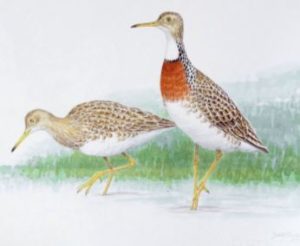
Flinders University researchers have contributed to the discovery of a new species of shorebird with the discovery of fossils in Central Otago, New Zealand.
The extinct bird dates from a time when New Zealand was covered in subtropical forests and crocodiles roamed parts of the South Island, and is a “missing link” in evolutionary terms.
In a paper published in the Journal of Systematic Palaeontology, New Zealand and Australian-based scientists have confirmed that the 19 to 16 million-year-old shorebird fossils belong to a group which had been thought to only comprise the Australian Plains-wanderer, one of Australia’s most endangered birds, and the South American seedsnipes.
The new species, Hakawai melvillei, has been named after New Zealand ornithologist David Melville to honour his efforts in the conservation of migratory shorebirds.
Lead author Dr Venesa De Pietri, formerly of Flinders and now a Canterbury Museum researcher, says that the team were excited to discover that the fossil shorebird was not a typical wader, but more like an ancestral Plains-wanderer, with some seedsnipe-like features. The Plains-wanderer and seedsnipes are unusual shorebirds as they have adapted well to living on the land.
“We’re happy to have found a fossil bird that provides a key morphological link between the two groups. The discovery of Hakawai melvillei has confirmed our thinking that the ancestors of the Plains-wanderer and seedsnipes were wading birds, like most other shorebirds,” she says.
“It has also confirmed previous research I’ve undertaken, with colleagues, that the Plains-wanderer and seedsnipes evolved their terrestrial habits independently.”
The discovery sheds light on evolutionary processes at work when South America, Antarctica, Australia, and New Zealand were part of the southern supercontinent of Gondwana. Hakawai melvillei, the Australian Plains-wanderer and the South American seedsnipe are all thought to have originated in East Gondwana.
The Hakawai melvillei probably became endemic to (only occurring in) New Zealand when it drifted apart from the rest of Gondwana.
Flinders University’s Dr Trevor Worthy, who led the study, said the discovery adds to an emerging story of New Zealand’s important role in the evolution of birds in the Southern Hemisphere.
“Unfortunately, like crocodiles, turtles, and some tropical birds, which once inhabited New Zealand, the lineage represented by Hakawai melvillei is long gone,” Dr Worthy said.
“We’re not sure what happened, but climatic and geographic changes during that time may have been partly responsible for its demise”.

